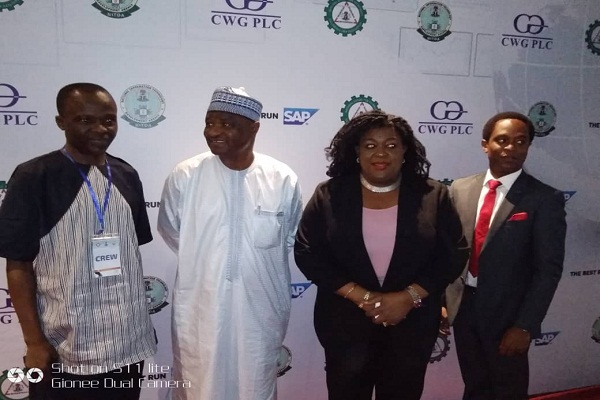Telecom
Stakeholders Reiterate Need For Development of Local Content in the Financial Sector

Stakeholders in the Information and Communications Technology (ICT) have reiterated the need for the use of Nigerian software in the financial sector.
They made this call at the ongoing stakeholder’s roundtable on the use of Nigerian software in the financial sector, with the theme:”Adoption and Development of Local Content Technology as Growth Driver for the Nigerian Economy”, holding in Lagos.
Dr Dan Ibrahim Azumi, DG, National Office for Technology Acquisition and Promotion (NOTAP) While speaking at the event said that their objective is to promote awareness for the development and utilization of local Technology Solutions in various sectors of the Nigerian economy.
According to him, “our objectives are to promote awareness for the development and utilization of local Technology Solutions in various sectors of the Nigerian economy, to discuss the challenges confronting the local Technology Solution Providers, identify specific areas where NOTAP and NITDA can intervene to create an enabling environment to enhance local vendorship.
“And also to identify companies with high demand for software Solutions developed in Nigeria, provide a platform for linking local software suppliers to end-users as an avenue to create and generate employment , income and wealth in Nigeria.”
He decried the huge sums of money being remitted out of the country without the foreign ICT owners assisting local partners to develop its knowledge base, capacity and intelligence as required by the terms of the agreement entered into.
He urged Nigerians not to be under any illusion that foreign firms are here for the development of our country, stressing that we need to be strategic to leverage on the available foreign technologies to ensure inclusive and sustainable growth of our country.
Speaking earlier, Dr Ogbonnaya Onu, Minister of Science and Technology, said that the Federal Government of Nigeria is emphasising on local participation in the execution of government contracts so as improve local content in national socio-economic development.
Dr Onu, who was represented by Prof. Gloria Elemo, Director General, Federal Institute of Industrial Research (FIIRO) said that the Economic Recovery and Growth Plan (ERGP) of the Federal Government of Nigeria led by President Muhammad Buhari is an developmental initiative focused on restoring growth, investing in people and building a globally competitive economy.
He noted that Executive Order No. 5 was signed by Mr President on February 2, 2018 with focused on the development of local content in Science, Engineering and Technology (SET).
According to him, “Mr President directed all MDAs of government to engage indigenous professionals in the planning, design and execution of national security projects with the intention to maximising the in-country capacity and capability in all contracts and transactions with SET components, utilizing Nigeria human and material resources in the planning and execution of Nigerian projects.
“The Order directed that all procurement entities of the FGN shall give preference to Nigerian companies in the award of contracts for major projects in SET and where local expertise is not available, Nigerian company shall enter into consortium with relevant foreign firms.
Director-General of NITDA, Dr Isa Pantami, who was represented by Dr Chris Okeke said the country saved N13 billion from 2018 up till now due to the ban of foreign techs and the use of local contents. The amount is up from the N5 billion previously recorded.
He said the policy was boosting ICT, the economy, the gross domestic product and helping diversity in revenue generation. He also said about 95 per cent of government websites are now hosted locally.
Telecom
Moniepoint Deepens Commitment to Africa’s Future Through Education and Innovation

Moniepoint Inc, one of Africa’s leading financial institutions partnered with the Mega Impact Foundation to support the 5th edition of the NextGen Connect Interschool Oratory Competition in Asaba, Delta state. This collaboration showcases Moniepoint’s unwavering commitment to youth empowerment and human capital development across the African continent.

The competition, which was held commemoratively to celebrate this year’s International Day of the Boy Child, brought together SS2 students from across Delta State to address the critical theme: “The Role of Financial Inclusion and Technology in Shaping a Brighter Future for Young People in Africa.” Moniepont has received critical acclaim over its core mission of advancing financial inclusion through innovative digital financial technology solutions and payment services..
The oratory competition showcased exceptional talent among Nigeria’s youth, with Otovo Praise of Crystalloid International School emerging as the champion. His outstanding performance earned him a full-year scholarship through the Tosin Eniolorunda STEM Foundation, reflecting Moniepoint’s philosophy of investing in educational excellence. Second-place winner Audi Innocent of St Patrick’s College received ₦300,000, while third-place winner, Asher David of Glorious Kids Academy was awarded ₦200,000.
“At Moniepoint, we believe that driving sustainable innovation begins with future-proofing and expanding the talent pool by empowering the next generation with the tools that they need to succeed especially basic literacy skills which remain fundamental pillars in socio-economic development,” said Tosin Eniolorunda, CEO Moniepoint Inc. “These young voices represent the future of African leadership, and their insights into financial inclusion and technology demonstrate the remarkable potential that exists within our communities. Through our various educational and developmental initiatives such as the CAD/CAM lab we donated to OAU last year or the Moniepoint DreamDevs programme, we are betting big on an investment in Africa’s future.”
The initiative extends beyond monetary rewards, creating meaningful platforms for young people to express their ideas on a global stage. Through its support of the NextGen Connect Conference and Tech-In-School conversations, Moniepoint is fostering an environment where youth can develop critical thinking skills, build confidence, and engage with pressing societal issues.
In her remarks, Founder, Mega Impact Foundation, Florence Ogonegbu said that “we reaffirm our commitment to building an Africa where every young person has simplified access to sustainable education, capacity building, and empowerment. By leveraging technology and local initiatives, we are creating platforms that enable our youth to thrive and transform their communities.
“Together with partners like Moniepoint, we are not just shaping futures—we are driving a movement for social development that will resonate globally. Every boy, every young person, deserves the opportunity to unlock their full potential and drive lasting impact across our continent.”
The competition received additional support from the Ministry of Women Affairs and Social Development, Delta State, highlighting the collaborative approach required to nurture young talent effectively.
Telecom
Zoho Unveils Zia Hubs to Harness AI Insights from Unstructured Business Data

Zoho, a global technology company, today launched Zia Hubs, a solution within Zoho WorkDrive that brings new forms of unstructured business data into the company’s broad portfolio of applications and AI services. Using Zia Hubs, organisations can now present any type of business content to Zoho’s powerful capabilities and services—including agentic AI, comprehensive analysis, and accurate, unified search—regardless of file format or structure.

“According to IDC, 80 percent of business data is unstructured,” said Kehinde Ogundare, Country Head, Zoho Nigeria. “Most unstructured data is text-based, meaning pertinent information lives within email conversations, social media posts, word processor documents, or audio and video transcripts. With Zia Hubs built into the full product suite, Zoho can provide customers with a deeper integration than any comparable software platform and nearly limitless potential uses for their data.”
Deeper Intelligence Accessing More Customer Data
Launching as part of Zoho WorkDrive, Zia Hubs brings content intelligence to the company’s unified content management and collaboration platform. Designed with a high level of user control over what content AI is allowed to access, Zia Hubs enables users to organise project or task-specific content into dedicated hubs within WorkDrive. Each hub serves as a focused space where Zia, Zoho’s flagship AI, can understand and act on the content stored within. This includes a wide range of formats such as PDFs, documents, videos, and audio files.
Zia Hubs automatically organises uploaded content by grouping related information—such as section headings, supporting text, and visuals—to preserve context. For video and audio files, Zia generates transcripts and links key moments to relevant topics, making it easier to pinpoint exactly where something was said.
With Zia Hubs, users can surface the most relevant answers when asked a question, even across different content formats. Each response includes clear citations that link back to the original content, whether it is a document, spreadsheet, image, or a specific moment in an audio or video file.
Organisations can also create custom workflows with Zoho Flow, automating document storage processes for particular projects or specific teams. This ensures that Zia always has access to the latest necessary documents automatically.
Furthermore, content from third-party software—such as Docusign PDFs, RingCentral call logs, Zoom video files—are all readable by Zia, and can be automatically placed into a hub by building a workflow with Zoho Flow.
From Intelligent Content to Intelligent Action with Zia
Zia Hubs is a foundational element of Zoho’s long-term AI strategy. It lays the groundwork for a future where intelligent agents can act contextually on content across the company’s entire product suite. With full ownership of its technology stack spanning more than 55 products, Zoho is uniquely positioned to help organisations unlock deeper value from their business content compared to competitors.
Potential use cases for Zia Hubs include: a legal team’s content hub hosting a case’s relevant files: court files, correspondence, and research, allowing a lawyer to have Zia provide summaries with citations without having to manually scan lengthy files to gain insights; a company’s support center placing call logs into a hub, then querying Zia to identify trends, like, “Have we received an increase in calls regarding specific issues?”
Future updates to Zia Hubs will enable it to identify structured information within unstructured files and trigger specialised agents tailored to specific business needs. This will further establish Zia Hubs as the central content intelligence layer that activates AI-native workflows across the full Zoho ecosystem.
Telecom
WhatsApp to Start Showing more Adverts in Messaging App

WhatsApp is launching three new ad features in a global roll-out across the messaging app.

The Meta-owned platform said the new ads will not be shown in the same place as people’s private chats, nor will the contents of their messages – which are encrypted – be used to decide which ads to display.
WhatsApp will instead use the country, city and language of the user, as well as how they interact with other ads and which channels they follow, to drive suggested content.
But people who have chosen to link their WhatsApp account to Facebook or Instagram will see more personalised ads.
The new ad features will appear in a section called Updates, which is a separate tab at the bottom of the app.
WhatsApp claims to have 1.5 billion users globally.
Businesses with channels will be able to choose to promote ads in the Updates section to attract new followers, and also charge a subscription to access extra content.
WhatsApp will eventually take a 10% commission of that fee, and there may also be extra costs on top of that taken at the app store level depending on the size of the business.
Firms will also be able to advertise in the form of a status update, which looks similar to an Instagram story and will link through to start a chat if clicked on.
Social media expert Matt Navarra told reporter that Meta is “laying the foundation for WhatsApp to finally become a monetisable platform at scale”.
But “monetising the periphery” of WhatsApp, while keeping personal chats private, would not be without risk for the company, he added.
This could particularly be the case in markets like the UK and Europe, he said, where the app is viewed primarily as a messaging tool with less appetite for content feeds or adverts.
“Any perception that the app is becoming noisy or Facebook-ified will spark backlash,” he said.
How does WhatsApp make money?
‘Natural extension’
It’s no coincidence that the new features bring WhatsApp more in line with Meta’s other platforms Facebook and Instagram.
“Obviously there’s overlap,” said WhatsApp boss Will Cathcart.
“We have stories on Instagram and stories on WhatsApp, and we now have a way for businesses to promote themselves in both, and we think that’s a good thing.”
He said he believed the move was a “natural extension of messaging services” and not dissimilar to features of rival apps such as Snapchat and Telegram.
For Mr Navarra, it also reflects a wider shift in the social media landscape.
“The feed is dying, public sharing is down, people are retreating into DMs and Stories in small groups,” he said.
“Meta’s trying to turn WhatsApp into a platform without users realising it and if they move too fast or it starts to feel like another ad network, people might disengage or maybe worse, distrust the app.”

 Telecom2 days ago
Telecom2 days agoGSMA, Mobile Industry Call for Strengthened Action to Advance Child Online Protection in Africa

 Telecom24 hours ago
Telecom24 hours agoALTON Clarifies on Migration to End-User Billing for USSD Services

 News2 days ago
News2 days agoDigital Africa Global Consult, NDPC Partner on Ground-Breaking “Nigeria Data Challenge” Initiative

 General News2 days ago
General News2 days agoTD Africa, HP Strengthen Partnership to Advance Africa’s Tech Ecosystem

 General News3 days ago
General News3 days agoAirtel Concludes Nationwide Environment Week with Market Clean-Up by Employees

 General News24 hours ago
General News24 hours agoAfrican Parliamentarians Seek Answers from Telcos on Quality of Service

 General News3 days ago
General News3 days agoCourt Orders Lawyer to Produce “Bail-Jumping” Client in MTN Cyber Fraud Case

 News1 day ago
News1 day agoFCCPC Orders Air Peace to Appear Over Alleged Refund Violations




























